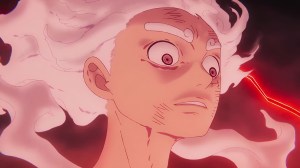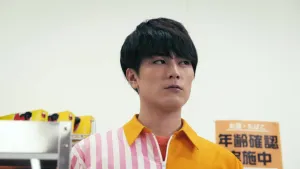The score for Captain Marvel — which felt like it would have been at home in the bright and bubbly action-comedies of the ’90s — did not feel very much like the one for Krypton, which tended to be quiet and brooding, with an emphasis on “alien-sounding” electronic music.
Videos by ComicBook.com
The two, though, were both composed by the same person: Pinar Toprak, who has also worked on things like Fortnite in the last couple of years.
Near the end of Krypton‘s first season, ComicBook.com spoke with Toprak about the job. The audio went missing for a time, but recently resurfaced — just in time for Captain Marvel to be in theaters Krypton: The Complete First Season to hit DVD and Blu-ray.
The sound of Krypton is unique — but there’s also been a handful of times that you’ve incorporated the John Williams Superman: The Movie score. How kind of complicated is it to find a way to organically hook these things together so they feel of a piece?
The John Williams theme, we had it in two episodes. The first one, and the very last one. The very first one, we knew we wanted to have it in two spots: one was the when we first use The Fortress of Solitude, the other one’s at the very end.
The trick was, okay, so how can it come so it feels like it was meant to be there, and not just transitioning into a completely different sound palette. It actually just kind of worked.
I had to have a version, just for legal reasons because we weren’t sure we were gonna be able to use the theme. I have a version of those exact cues with my theme, the Seg-El theme, just to see how it would in have worked. It was designed in a way that it could work either way. I think that was the reason why it kind of fit organically right on top of it.
Other than those moments, we haven’t used that theme at all; we’ve tried to keep it as original as we possibly could.
How closely did you work with Cameron Welsh to develop the sound, or was this the thing where they handed you footage, and you came back with a relatively fully-formed idea? What was the process?
I spoke with Cam when I was demo-ing for the pilot to get the job. The direction, mostly, was just to create something new. They wanted to hear something that they hadn’t really heard before…which could mean anything.
I went with my own gut. I figured, okay, I didn’t have a whole lot of time to overthink it anyway. It was good in that sense; I had just less than two days with the sound palette, and overall told them that I would be right for the project. I did my thing. I made a few sounds and wrote some things. Luckily that worked out.
On an ongoing basis, we have our producer here, Andrew Chowerton, who was very hands-on and Cam was in contact with everybody every week. We’d fine-tune everything. After a few episodes, we found the tone. It was a well-oiled machine after that.
The music can be balanced very low, relative to the rest of the show’s sound. It’s almost ambient sound more than a really present score in a lot of scenes. How difficult is it to create something that’s kind of unique and engaging when you know a lot of it is going to be kind of buried four levels deep?
Well, hopefully if we get a soundtrack release, you guys are gonna be able to hear all that in more detail. You’ll be able to catch a lot more. But in the context of the show, there’s so much going on and we have a very effects heavy show — it’s kind of nature of the beast.
That’s what happens; we have big sound effects and things, and need to make sure everything is heard in the dialog. But as far as keeping it engaging, I think the whole role of the score in general, whether it’s for TV show or film, it’s to convey what’s going on that’s not being said — a subliminal feeling, so to speak. Often, we didn’t have to be on the nose with things. Get the feeling and emotion across without having to shout it out, so to speak.
Are there still themes, like you would have in a feature film, that you had for specific characters considering how many characters there are, and how relatively few episodes there were?
Oh, yes. You have a ton of themes. Actually, it’s funny you ask that, because just when we did the very last episode, my music editor was asked to put together kind of meta-tag of all the music that in all the episodes. There’s quite a long list, because during the 10 episodes is almost wall to wall. There’s a lot of music.
One of the things he had to do was to kind of metatag all of them. He had to list out all the things. We had a gigantic list of things which is pretty remarkable, considering the time we had to work with. There are a lot of things. There’s the main House of El theme that we hear quite often. We’ve definitely had the Rao theme. We had definitely the Zod, and Brainiac is a huge one, which evolved over time. And now a glimpse of Doomsday. There’s just a big list of things that we have to keep straight.
When you have two very powerful, very dark forces like say Zod and Doomsday in the same space, is it difficult to distinguish between their moments, and not have the music cues feel like they overlap too much?
That was one of the challenges actually. We wanted to do that Brainiac which, up until the discussion of Doomsday, was the big character, right? Then, we had Doomsday.
But for Brainiac, I didn’t want a “singable” theme. I wanted more of a feeling. We had a number of sounds, and every time you’d hear this sound, you know it’s Brainiac or Brainiac-related. A cerebral reaction to him. That was kind of how I differentiated with both of them. They’re sonically very different.
The easy way to do things with somebody like Brainiac would be to look at modem noises or something, and take something very computerized, and then just find a way to match it to your palette.
Right. I didn’t think too literally. What I did was, I heard a sound in my head. I knew what I wanted to get to. But I want this almost, it’s hard to describe it, but I wanted this almost monstrous but of course electronic. Almost like growling but not really, and this weird, bendy sound. I just kept hearing that in my head. Once I knew that was the goal, I just made a whole bunch of sounds once I got close to it.
I would assume in season two we will see other city-states. If we travel outside of Kandor, are different places outside just the city going to have a different sonic footprint, kind of like how was it to differentiate the Outlands versus the city?
I can’t say anything about next season, but if there were to be differences in our environment surroundings and characters and whatnot, of course it’d be addressed musically for sure.
Captain Marvel is in theaters now. The first season of Krypton was just released on DVD and Blu-ray. The second season is expected this spring on SYFY.








